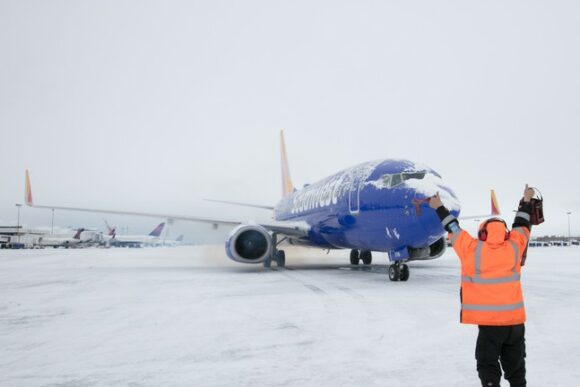
Despite high infections rates across the US and elsewhere in the world, Delta Airlines expects the worst of the Omicron crisis to settle down from around mid-February. The airline is projecting losses for January and February but a recovery of demand around President’s Day (February 15), with revenues for the current quarter recovering to 72-76 percent of 2019 levels compared to 74 percent in Q4 last year. Delta expects Omicron-effect to end by mid-February.
With the release of its 2021 results on January 13, Delta is the first airline to do so. Compared to 2020, the airline saw a significant recovery in air travel. A strong performance, especially on domestic, produced profitability that continued during the rest of the second half of the year. In the third quarter, Delta reported a $1.212 billion profit.
Delta’s adjusted pre-tax loss for the full year was $3.4 billion compared to $-8.996 billion in 2020. The loss excludes a net benefit of $3.8 billion in payroll support programs, partially offset by other losses. The second half of the year produced a $1.1 billion pre-tax profit or adjusted $386 million.
The operating profit for the full year was $1.886 billion compared to a $12.469 billion loss in 2020. In its 2021 results, Delta only compares the year with 2019, but AirInsight likes to compare with 2020 as this is the format applied by most other airlines.
The carrier’s total revenues improved to $29.899 billion (adjusted: $26.670 billion) versus $17.095 billion in 2020. Passenger revenues accounted for $22.5 billion, an increase of almost ten billion. Cargo revenues also increased to $1.032 billion, up from $608 million. Revenues are almost back to eighty percent of 2019 levels. Operating expenses were $29.2 billion up from $24.1 billion but still benefitting from lower salary costs and other benefits.
Looking at the December quarter, Delta produced a $170 million adjusted pre-tax profit thanks to strong bookings for the holiday season, compared to a $2.121 billion loss in Q4 2020. The result excludes a net impact of $564 million in equity method losses and other adjustments. Revenues ended at $9.470 billion versus $3.973 billion in the previous year. Domestic passenger revenues were at 78 percent of 2019 levels in December, six points better over Q3. International revenues were eight percentage points higher to fifty percent as borders reopened in November. The operating cash flow was $555 million positive, but free cash flow ended at $-441 million as the airline reinvested $948 million in capital expenditures.
Premium cabins continue to be popular
Once again, passengers seem to have a preference for premium cabins, especially when flying domestic or on Delta’s Latin American network. Premium revenues touched 84 percent in December, nine points better than the main (Economy) cabin. While most will have flown premium for leisure reasons, Business Class is seeing a gradual return of the business traveler. On domestic flights in December, they were back to sixty percent of 2019 levels but since then, Omicron has affected business travel the most as meetings are canceled. The characteristics of Omicron (highly infectious but short-lived) seem to indicate that businesses can be opened quicker than expected. But as President Glen Hauenstein said: “Premium leisure is here to stay.” The new Premium Select product will be introduced on the transatlantic network this summer.
Omicron is spoiling the picture, although CEO Ed Bastian said that flight cancelations related to the highly-transmissible virus are currently just one percent. Yet, the airline expects losses in January and February and a negative result this Q1, but if the effects go away by mid-February when cases decline, March itself should see a return to profitability as the recovery accelerates, says Hauenstein. Delta plans to operate at 83-85 percent capacity this quarter, producing 72-76 percent in revenues compared to 2019.
2022 should deliver a ‘meaningful profit’
Without further disruptions from new virus mutations or other issues, 2022 should produce a strong second, third, and fourth quarters, and a meaningful profit for the full year. Transatlantic travel should be strong this summer as restrictions ease and Latin America is resilient, but Asia remains soft. Capacity should recover to ninety percent, restoring the airlines’ scale of efficiency. Gross capital expenditures will be $6.0 billion, largely related to the induction of some seventy aircraft.
Delta will also rehire ‘several thousands’ (3.000-5.000) of staff this year and, as a result, isn’t expecting staffing issues. The mainline currently hires 100-200 pilots a month and isn’t having problems at all in getting them, although Bastian acknowledges that regional airlines are experiencing staffing issues. The airline hasn’t closed any stations but has cut back on regional services by some 25 percent and temporarily parked aircraft.
At $1.6 billion, fuel costs were up by four percent in Q4 compared to Q3, with an adjusted fuel price per gallon of $2.10. For the current first quarter, Delta is calculating with a fuel price of between $2.35 and $2.50 per gallon.
Delta Airlines ended 2021 with $14.2 billion in liquidity, including a $2.9 billion revolving credit facility that was undrawn. Net debt and lease obligations stood at $26.9 billion or an adjusted net debt of $26.0 billion. The airline reduced gross debt by $6.0 billion and remains a top priority for this and the next years. In 2022, debt maturities are $1.8 billion.



